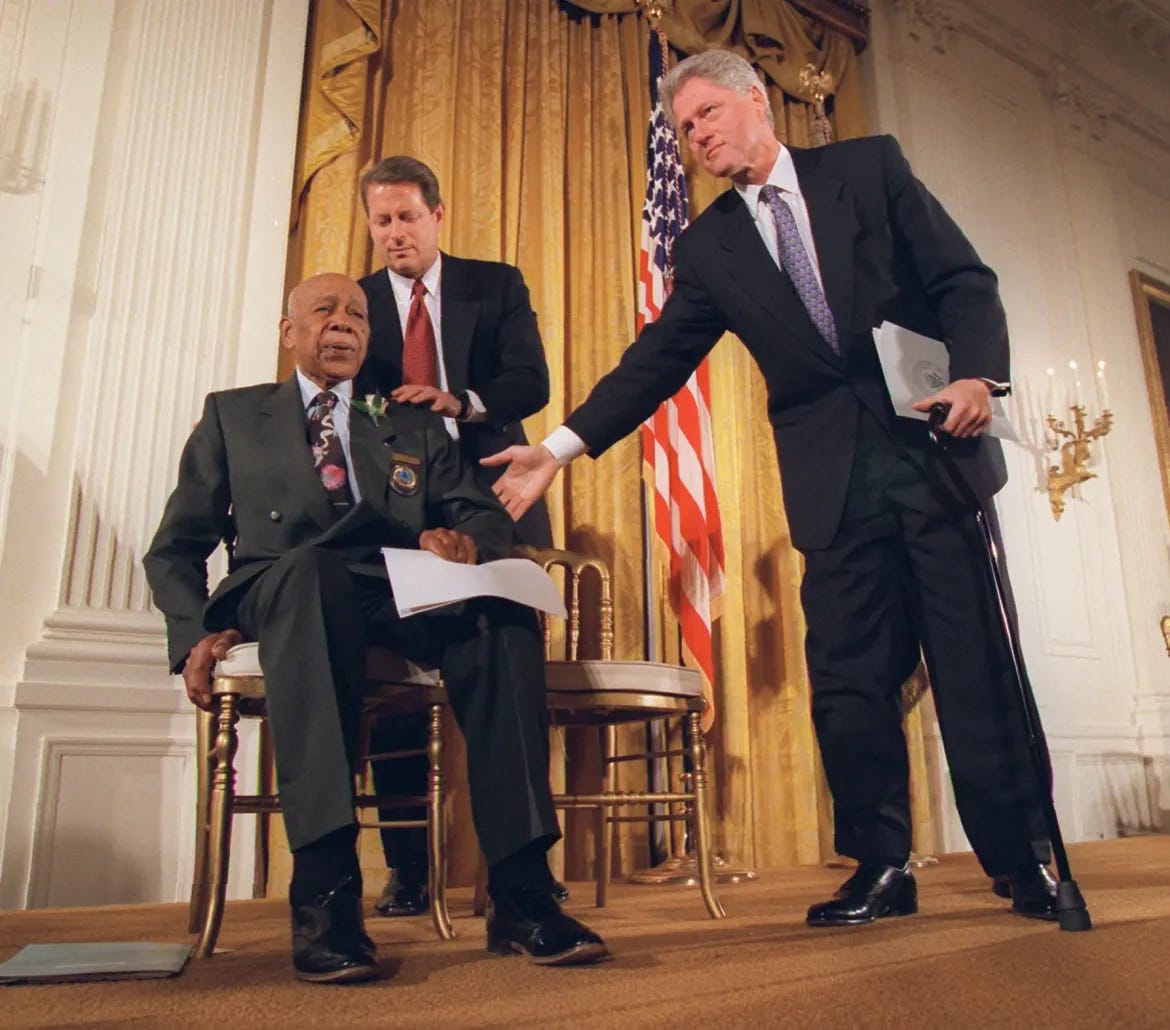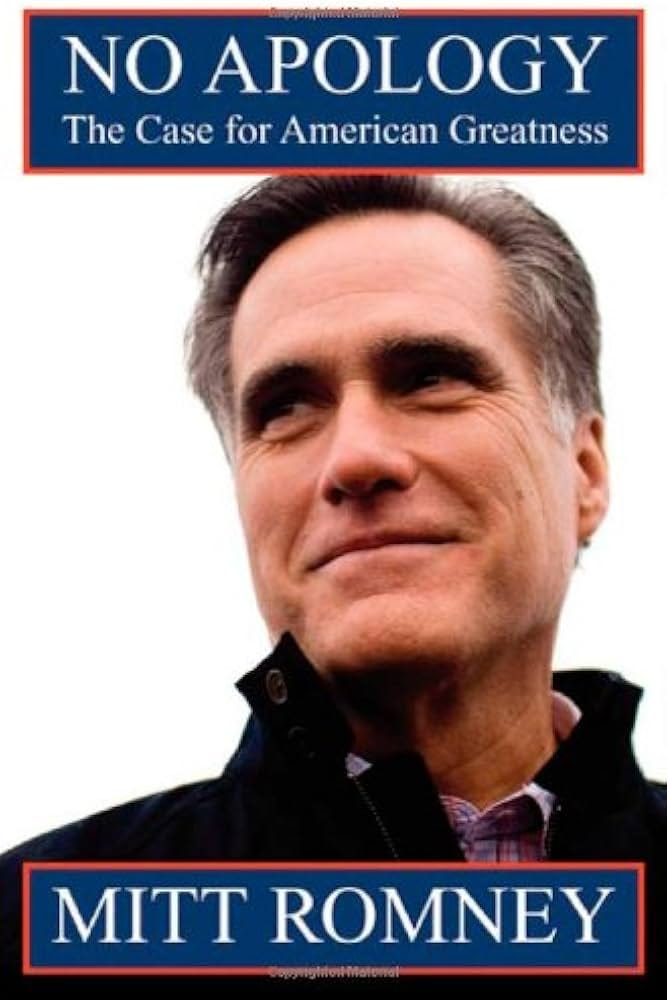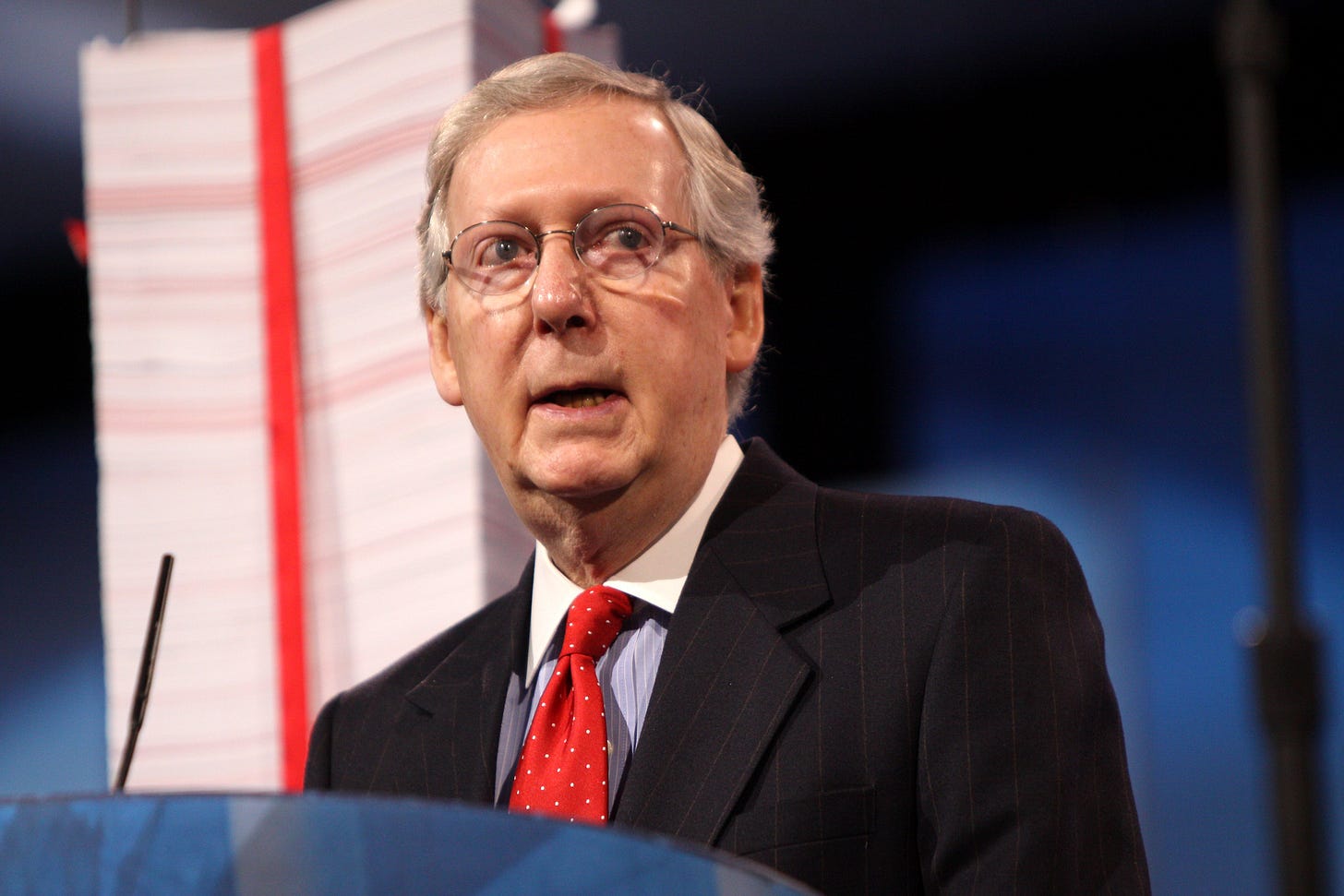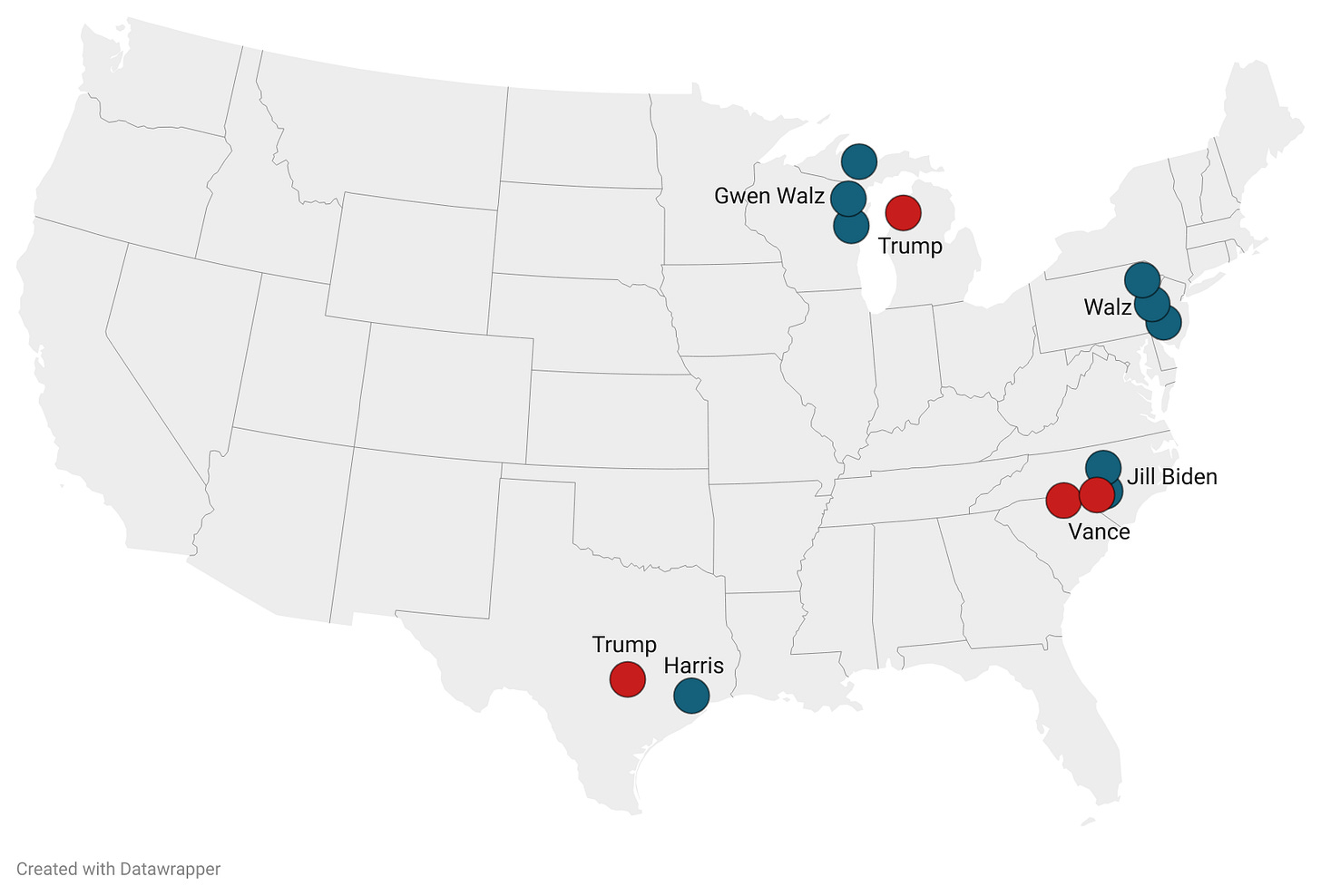The politics of apology
A brief history of the U.S. government saying “sorry.”
Good morning! It’s Friday, October 25, 2024. Election Day is 11 days away.
But today, I want to cast my gaze elsewhere. When Congress is in session, I usually set Fridays aside to fill you in on under-the-radar pieces of legislation working their way through Washington. This week, with Congress out of town, let’s take a look at an under-the-radar action from the executive branch…
Later today, Joe Biden will do something unusual for a president: He’ll apologize.
Biden is set to travel to the Gila River Indian Community in Arizona, fulfilling a promise made earlier in his administration to visit a Native American reservation during his presidency.
While there, Biden will issue a formal apology for the federal government’s role in the Indian boarding school system that operated in the U.S. between 1819 and 1969, which separated Native American children from their parents and used brutal methods in an attempt to assimilate them into white society.
The schools — more than 400 of which were either established by the federal government or received federal funding — subjected their students to “rampant physical, sexual, and emotional abuse,” according to an Interior Department report in 2022. A follow-up report found that at least 973 Native children died while attending these schools; many of them were buried in unmarked graves.
“I’m heading to do something that should have been done a long time ago,” Biden told reporters on Thursday, “to make a formal apology to the Indian Nations for the way we treated their children for so many years. That’s why I’m heading West.”
No politician likes to apologize, of course, although occasionally presidents have for personal or political misdeeds — like Bill Clinton when he admitted to having an affair with Monica Lewinsky or Barack Obama when he walked back his claim that anyone who wanted to keep their health insurance plan would be able to under Obamacare.
Other presidents have also issued mea culpas like Biden’s, formal apologies on behalf of the government for historical misdeeds.
The most famous example of this is probably the Civil Liberties Act of 1988, which offered reparations to Japanese-American who had been interned by the U.S. government during World War II. “For these fundamental violations of the basic civil liberties and constitutional rights of these individuals of Japanese ancestry, the Congress apologizes on behalf of the Nation,” read the bill, which was passed with bipartisan support and signed into law by Ronald Reagan.
When payments of $20,000 were mailed to the surviving internees over the following years, they were accompanied by letters of apology from Reagan’s successors, George H.W. Bush and Clinton. “On behalf of all Americans, I offer a sincere apology,” Clinton wrote.
Under Clinton, the U.S. sought to right several other historical wrongs. Congress voted across party lines in 1993 to pass a measure known as the Apology Resolution, which offered a formal apology “on behalf of the people of the United States” for the U.S. role in the 1893 overthrow of the Kingdom of Hawaii, which led to Hawaii’s annexation by the U.S. government.
Six years later, in 1997, Clinton apologized for the Tuskegee Syphilis Study, the 40-year-long experiment conducted by the U.S government during which hundreds of Black men with syphilis were not told they had the disease and were deliberately not given treatment. More than 100 of the participants died as a result.
“The United States government did something that was wrong — deeply, profoundly, morally wrong,” Clinton said at a White House ceremony attended by survivors of the experiment. “It was an outrage to our commitment to integrity and equality for all our citizens… To our African American citizens, I am sorry that your federal government orchestrated a study so clearly racist.”
In 1999, Clinton offered another yet apology, this time to the people of Guatemala, for U.S. support of right-wing governments there that killed tens of thousands of rebels as part of a decades-long civil war.
Sometimes, official apologies are buried. That was the case in 2010, when an “Apology to Native Peoples of the United States” — expressing regret for the “many instances of violence, maltreatment, and neglect” inflicted on Natives by the U.S. — was tucked away in that year’s Defense Department appropriations bill.
Some tribal leaders criticized Obama, who was president at the time, for not publicly acknowledging the apology when he signed the bill into law. “Is an apology that's not said out loud really an apology?” the newspaper Indian Country Today asked at the time. “What if the person expressing the apology doesn’t draw attention to it?”
Perhaps Obama was hesitant to publicize the move because, early in his presidency, he came under frequent scrutiny from Republicans for his other apologies on behalf of the U.S. A Heritage Foundation list from June 2009 — just six months into his term — chronicles apologies to European allies (“We must be honest with ourselves, in recent years we’ve allowed our alliance to drift”), the Muslim world (“We have not been perfect”), and those impacted by the War on Terror (“We went off course”), among others.
Obama’s apologia became such a major trope of Republican criticism that it inspired the title of the 2010 book published by Mitt Romney — “No Apology” — as he was preparing to launch a presidential campaign against Obama.
After Obama beat Romney in 2012, he resumed expressing national remorse. According to the New York Times, in his final year in office, it became “practically routine” for Obama to acknowledge “the United States’ unsavory history in a country he was visiting,” including Cuba, Argentina, Vietnam, Laos, and Japan.
Acknowledgment was not always the same as apology, however, and Obama rebuffed activists who hoped he would offer a formal apology to the citizens of Hiroshima, Japan, when he became the first sitting president to visit the site of the 1945 atomic bombing. (Biden also did not apologize during a visit to Hiroshima last year.)
Obama also faced calls to offer a formal apology for slavery, which he did not do as president — although, interestingly, both chambers of Congress unanimously passed resolutions to that effect around his election. The House passed a bipartisan resolution “apologizing for the enslavement and racial segregation of African-Americans” in July 2008, and the Senate followed with a similar measure in June 2009, although adding a disclaimer that nothing in the resolution could be used to support legal claims against the government. The two versions were never reconciled.
Political considerations are often not far from presidential decisions to apologize — or not apologize — and Biden’s move today isn’t any different. Native American voters have been a sought-after constituency this election cycle, with both parties deploying surrogates to chase their votes.
There are more than 300 federally recognized reservations in the U.S. — which means it is unlikely a coincidence that Biden, offering his apology today, chose to visit one in the swing state of Arizona. Biden, after all, won Arizona by 0.3% in 2020; Native Americans make up 6.2% of the state’s population.
More news to know
The world has made essentially no progress in curbing fossil fuel emissions in the last year.
A former model is claiming that Trump groped her in front of Jeffrey Epstein in 1993. Trump denies the allegation.
Would Trump pardon Hunter Biden? Maybe, he says.
All the questions Harris refused to answer in her CNN town hall.
A former Michigan Republican congressman who voted for Trump’s second impeachment endorsed Harris. So did the mayor of Waukesha, Wisconsin, who was a Republican until leaving the party after January 6th. And Wisconsin’s longest-serving Republican state senator.
This think tank is poised to be more influential than Project 2025 in setting a Trump second-term agenda.
Campaign events since September 1, per NYT: Trump 73, Harris 55. Media appearances: Trump 64, Harris 31.
Is Bill Hagerty the new Rex Tillerson?
McConnell to his biographer: The “MAGA movement is completely wrong.”
Women who have abortions “hate the country” and “hate that baby,” swing-district Rep. David Schweikert (R-AZ) said in 2022, according to newly unearthed audio.
The top Democrat on the House Ways and Means Committee’s son has received payments from lobbyists with business before his dad’s committee.
The day ahead
Vice President Kamala Harris will deliver remarks on abortion at a rally Beyoncé in Houston, Texas. Gov. Tim Walz will make campaign stops in Philadelphia, Allentown, and Scranton, Pennsylvania. Gwen Walz will hold events in Green Bay and Marinette County, Wisconsin, and Marquette, Michigan.
Former President Donald Trump will deliver remarks on border security in Austin, Texas, and hold a rally in Traverse City, Michigan. Sen. JD Vance will hold events in Raeford and Monroe, North Carolina.
President Biden will deliver remarks at the Gila River Indian Community in Arizona. First Lady Jill Biden will travel to North Carolina to meet with volunteers who assisted in the aftermath of Hurricane Helene in Asheville, and to hold campaign events in Fayetteville and Cary.








Its sobering but necessary read to reflect on.
Great piece. I wrote a short essay on the philosophical aspects of political apologies here, if that tickles anyone’s fancy https://open.substack.com/pub/wollenblog/p/some-notes-on-political-apology?r=2248ub&utm_medium=ios